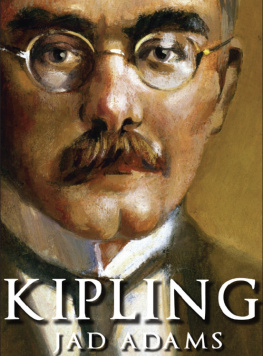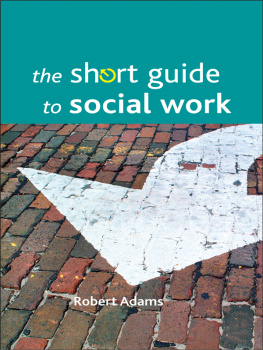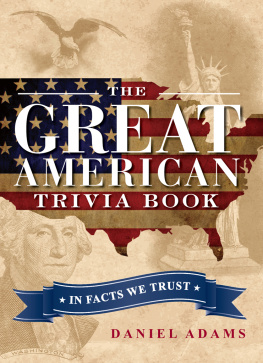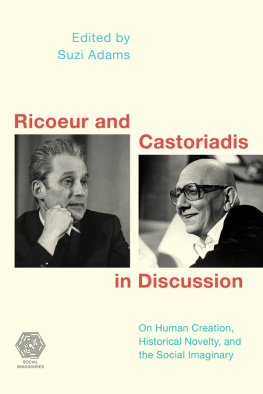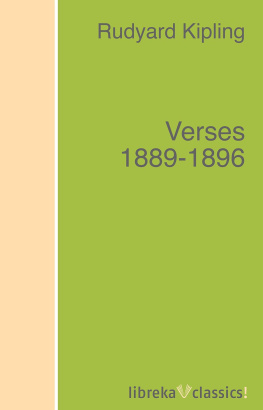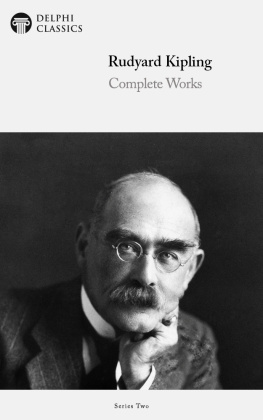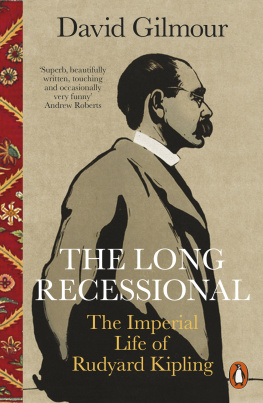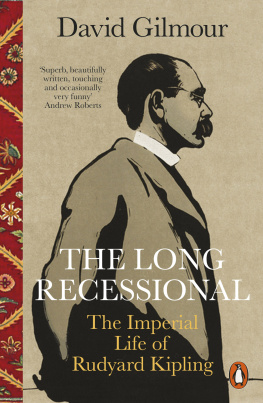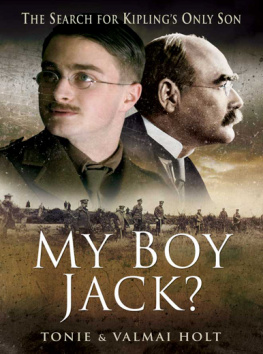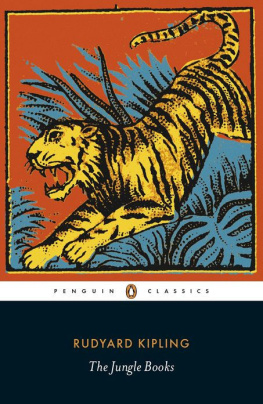Adams - Kipling
Here you can read online Adams - Kipling full text of the book (entire story) in english for free. Download pdf and epub, get meaning, cover and reviews about this ebook. City: New York, year: 2013, publisher: Haus Publishing, genre: Detective and thriller. Description of the work, (preface) as well as reviews are available. Best literature library LitArk.com created for fans of good reading and offers a wide selection of genres:
Romance novel
Science fiction
Adventure
Detective
Science
History
Home and family
Prose
Art
Politics
Computer
Non-fiction
Religion
Business
Children
Humor
Choose a favorite category and find really read worthwhile books. Enjoy immersion in the world of imagination, feel the emotions of the characters or learn something new for yourself, make an fascinating discovery.
- Book:Kipling
- Author:
- Publisher:Haus Publishing
- Genre:
- Year:2013
- City:New York
- Rating:5 / 5
- Favourites:Add to favourites
- Your mark:
- 100
- 1
- 2
- 3
- 4
- 5
Kipling: summary, description and annotation
We offer to read an annotation, description, summary or preface (depends on what the author of the book "Kipling" wrote himself). If you haven't found the necessary information about the book — write in the comments, we will try to find it.
Kipling — read online for free the complete book (whole text) full work
Below is the text of the book, divided by pages. System saving the place of the last page read, allows you to conveniently read the book "Kipling" online for free, without having to search again every time where you left off. Put a bookmark, and you can go to the page where you finished reading at any time.
Font size:
Interval:
Bookmark:
It does not much matter what people think of a man after his death, wrote Kipling near the end of his life, with a scornful eye on future biographers.
With a view to frustrating biography, he set about the destruction of many of his own papers, and those of his parents, and wrote an autobiography almost comically deficient in its description of his life events.
He knew his life would attract interest. He was the most famous English writer in the days when Britain ruled the largest empire ever known; he was the first writer of English to win the Nobel Prize.
His work was richly biographical: Kipling was cruelly abandoned and abused as a child, but was to create some of the most enduring childrens characters ever written in Mowgli and Kim.
He took inspiration for his childrens tales from his own children but, to his despair, two were to die young. Family quarrels and the mental illness of those around him cursed his middle years; and in old age simplistic political views, crudely expressed, diminished his reputation.
He has been castigated as a misogynist, though few writers of either sex have written so warmly about middle-aged women. Similarly, he can be criticised for his racial views, but no other artist wrote with such intimacy of native life. He was physically unfit for military service but his identification with soldiers was so deep that real soldiers started acting like the characters in his stories.
Kipling was in London in the spectacular 1890s, placing him in the spectrum of literary decadents and hearties, when it was by no means obvious in which group he fitted. The contradictions in his character are revealed in his biographical novel The Light that Failed, which gives an insight into the challenge of the New Woman to society, the paralysing confusion which struck men when presented by a woman who, like the woman Kipling himself loved, had her own goals in life, her own work and her own sexual self-sufficiency.
Kipling was the first world writer, making his home in four continents. While he is thought of as quintessentially Indian, he in fact spent only 12 of his 70 years in India, visiting the country for the last time at the age of 25. He married an American and spent the first four years of his married life in the United States. He kept a home in South Africa for 35 years, to the end of his life. America supplied his wife, the formidable Carrie; and Africa a father-figure for his mature years in the form of Cecil Rhodes. He had a close relationship to France all his life, which was reciprocated in the acclaim he received there.
Kiplings work is now so well known that many people who have never read any Kipling think they have. He added more phrases to the language than any writer except Shakespeare and the translators of the King James Bible.
Unlike his contemporaries in London Conan Doyle, Oscar Wilde or Bram Stoker, who created one enduring character each Kipling created a cast of characters who live independently of the stories, such as Mowgli, Mrs Hauksbee, Kim and Mulvaney. The only recent writer he resembles in this is Dickens, another immensely prolific writer and also a journalist as well as a fiction writer. In verse, Kipling is a true successor to Browning, Swinburne and Tennyson, whose clear influences he shows. His poem If is still among the best known in the English language.
Despite his many achievements, Kipling was always a subject of controversy: at first he was adored by reviewers; after 1891 he was attacked by the critics yet adored by the public; as the 20th century wore on he fell from favour with the public but increasingly began to enjoy the grudging respect of critics. Regardless of the criticism, this multi-faceted man will not go away: his work stays in print and new generations around the world read him. As George Orwell said, During five literary generations every enlightened person has despised him, and at the end of that time nine tenths of those enlightened persons are forgotten and Kipling is in some sense still there. He wrote thus in 1942, a truth which is undiminished by the passing years.
With his rich evocation of the Indian sub-continent, it is difficult to imagine Rudyard Kipling as anything but a son of India, though his birth in Bombay in 1865 was largely a matter of chance. The Kipling family had arrived in India less by design or desire than as a result of a successful job application.
Kiplings father, John Lockwood Kipling, the son of a Methodist minister, became an architectural sculptor, securing a post at the Department of Science and Art in South Kensington. On departmental trips to the potteries in Staffordshire he became friendly with the family of another Methodist minister, Frederick Macdonald, who had five lively sisters. John Lockwood (always known by his middle name) first met Alice Macdonald at a picnic at Lake Rudyard, Staffordshire, in spring 1863. She was pretty and witty, and they discovered a common love of Browning and other artistic interests.
The Macdonald sisters were to weave themselves deeply into the fabric of artistic and political life in England, giving Rudyard Kipling a network of contacts which belied the impression he often sought to give of a struggling writer who had achieved everything by his own efforts. He was in fact born into a highly successful and influential family. His aunt Georgina married the leading Pre-Raphaelite painter Edward Burne-Jones; his aunt Agnes married another successful artist, Edward Poynter; his aunt Louisa married a wealthy iron-master, later chairman of the Great Western Railway and father of Stanley Baldwin the prime minister.
By comparison Alices marriage to Lockwood Kipling on 18 March 1865 in Kensington was not felt to be a great match, though the reception was a grand affair attended by such luminaries as Swinburne, Rossetti and Ford Madox Brown.
Lockwood, eager to make his way in the world, had accepted a post as architectural sculptor at the School of Art and Industry in Bombay. The newlyweds sailed on 12 April 1865, and Rudyard was almost certainly conceived on the journey. They arrived at Bombay, the Gateway of India, which was rapidly becoming the commercial heart of the sub-continent. With neither having any previous family experience of India, Alice and Lockwood Kipling must have experienced what would later be called culture shock when they first encountered the heat, the crowds, smells, sounds and colours of India when the ship docked to be met by teeming crowds of porters, hawkers and families waiting for the boat, amid a crush of rickshaws, carriages and working animals, including elephants.
Lockwood took up his position at the school of art founded by a Parsee, Sir Jamsetjee Jeejeebhoy. He wanted Bombay to become an artistic as it was an industrial centre, rather as English industrialists in Manchester and Birmingham had turned from the mere production of wealth to the cultivation of the arts. Lockwood set to work learning Indian techniques and materials and reviving the great Indian art of sculpture.
Alice Kipling settled down to pregnancy in unfamiliar surroundings in a whitewashed bungalow close to the Jeejeebhoy School of Art, which was still under construction. She had to learn how to deal with the servants, who were far more numerous than in households she had known in England, and to come to terms with the rigid Anglo-Indian social hierarchy in which the Kiplings occupied a far from senior position.
The birth of her son was difficult, taking six days; a labour relieved, the servants said, only when they sacrificed a goat kid to the goddess Kali. The baby arrived on 30 December 1865 and was christened Joseph Rudyard Kipling, though he was always known as Rud or Ruddy.
The British India into which Kipling was born in 1865 was just seven years old, having been founded in 1858 by the India Act. The British had progressively dominated India, with a series of spectacular military victories, the most notable of which was Clives at Plassey in 1757. The country was governed, however, by the East India Company, the primary objective of which was obviously commercial.
Font size:
Interval:
Bookmark:
Similar books «Kipling»
Look at similar books to Kipling. We have selected literature similar in name and meaning in the hope of providing readers with more options to find new, interesting, not yet read works.
Discussion, reviews of the book Kipling and just readers' own opinions. Leave your comments, write what you think about the work, its meaning or the main characters. Specify what exactly you liked and what you didn't like, and why you think so.

